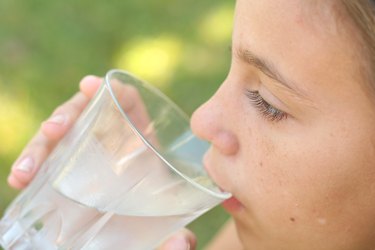
Relying on your child's thirst alone may not keep him hydrated. It's important for children to drink an adequate amount of fluid during the day to prevent dehydration. According to the Institute of Medicine, most children ages 1 to 3 need at least 35 ounces of fluid per day, children ages 4 to 8 need at least 46 ounces per day, boys ages 9 to 13 need at least 65 ounces per day and girls ages 9 to 13 need at least 57 ounces per day. However, calculating individual fluid needs based on weight gives a more accurate indicator of fluid requirements.
Step 1
Weigh your child on a scale. You'll need this for calculating fluid needs.
Video of the Day
Step 2
Multiply weight in pounds by 1.52 to get the ounces of fluid needed per day. This is for children weighing 2.2 to 22 pounds, per the Holliday-Segar Fluid Requirement Equation, as posted on the Olin College website. For example, if your child weighs 12 pounds, they need at least 18 ounces of fluid per day. If your child weighs more than 22 pounds, use calculations in step 3 or 4 accordingly.
Step 3
Subtract 22 from your child's weight in pounds for children weighing 23 to 44 pounds. Multiply your result by 0.76. Now add 34 to get the minimum ounces of fluid needed per day. For example, a 30-pound child needs at least 40 ounces of fluid daily.
Step 4
Subtract 44 from your child's weight in pounds for children weighing more than 44 pounds. Multiply your result by 0.3. Now add 51 to get the minimum ounces of fluid needed per day. For example, a 50-pound child needs at least 53 ounces of fluid daily.
Things You'll Need
Paper
Writing utensil
Calculator
Scale
Tip
Offering and encouraging plain water, milk and all-natural, no sugar-added fruit juices throughout the day helps boost fluid intake. If your child is dehydrated, KidsHealth.org suggests providing a pediatric electrolyte beverage. You can also use coconut water, which is an all-natural electrolyte beverage.
Warning
A child's fluid requirements increase if he is sick, has a fever, was vomiting, has diarrhea or is sweating a lot. If your child's condition worsens or does not improve, call your health care provider or take him to an emergency care center.
Video of the Day